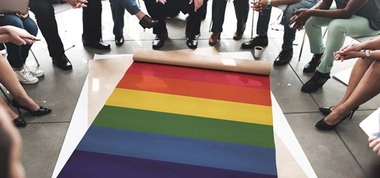Like many, the LGBT+ community struggles with sobriety

by Mikel LaPorte
Guest Columnist
Connection, we all crave it. So, when our social media starts blowing up with messages on Friday afternoon asking where the happenings are for the weekend, we begin to get excited.
Whether we are going to the hippest happy hour in town or attending an intimate dinner party with just a few friends, we all want to feel included.
For many of us, choosing whether to go to a social event is no big deal. However, for roughly 15 percent of our community, the decision to attend (or not) can be daunting, and sometimes, a life-endangering task. This number represents the individuals in our community who are in recovery from some form of addiction.
Now, before you dismiss what may seem like a small number, remember that addiction does not discriminate. Someone in recovery may be your best friend, your boss, or that hot person you saw across a crowded, smoky room last Friday night while you were out with your friends.
The consequences of attending a social event are small for many, but for someone in recovery, it means exposure to old patterns or individuals that enabled their substance use.
They may ask themselves, “If I go will I be able to avoid my drink or drug of choice?” “Will my friends like me sober?” “Will I be able to have fun if I don’t use?”
There is the chance of someone in recovery choosing to partake in their substance of choice “just this one time” leading them down a path which can have dire consequences. Their choice could be something like losing a job or a relationship.
Sometimes the loss is much greater, including the loss of their sanity.
What, then, is someone in recovery supposed to do? Do they isolate themselves? That seems like a high price to pay and might not be the best idea since the Substance Abuse and Mental Health Services Administration (SAMHSA) has found that community, defined as having relationships and social networks that provide support, friendship, love, and hope, is a critical dimension that supports a life in recovery.
For those in recovery, redefining that social network may prove beneficial. Maybe that means connecting with others in recovery through a support group, finding an activity to enjoy with friends outside of the normal LGBTQIA establishments, or hosting your dinner party or other social function.
Make sure attendees understand it is a drug and alcohol-free event.
With a little creativity and effort, one can either find or create social encounters that do not include drugs and alcohol.
If you, or someone you love and support, need a recovery support group then I encourage you to find one that is LGBTQIA focused; www.GayandSober.org is one resource you can use to find local support.
Many therapists also offer support groups. Be sure to find one where the therapist is not only gay-friendly, but also gay informed, meaning the therapist understands the minority stress issues of our community, and how those issues might affect one’s recovery.
September is National Recovery Month. It’s a great time for those in recovery to assess how their recovery is going and to make any necessary adjustments, especially as it relates to socializing. It is also a great time for everyone else to reach out to a friend in recovery and offer them support.
Copyright The Gayly. 9/23/2018 @ 1 p.m. CST.





